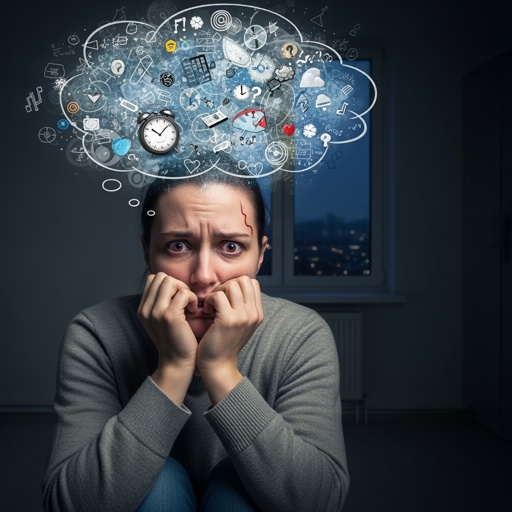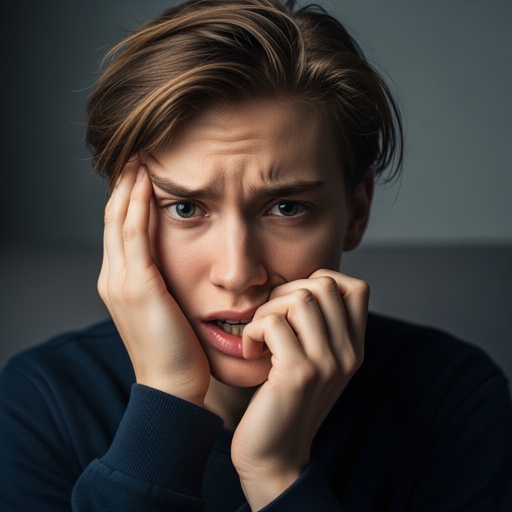Introduction to Anxiety and Headaches
Anxiety is a condition that can affect both mental and physical health. It presents with a range of symptoms that vary from person to person; from feeling on edge to functional neurological disorders (FND). One of the physical effects of anxiety that many report is recurring headaches. These headaches are not just an annoyance; they can significantly impact daily functioning of everyday life and overall well-being, especially when the severe pain of migraine headaches. The physical connection between anxiety and headaches stems from the body’s response to stress, which can result in tension and discomfort that manifests in the form of head pain.
Anxiety can influence the nervous system, leading to heightened sensitivity and physical discomfort, including headaches. For some, these headaches may be mild and manageable, while for others, they can be persistent and debilitating migraines. Because of the complex relationship between emotional and physical health, it’s not always easy to identify whether a headache is directly related to anxiety. However, understanding this link is key to addressing both the physical and emotional triggers that contribute to these symptoms.
Headaches linked to anxiety can take different forms, making it important to identify their specific characteristics and causes. From tension headaches triggered by muscle stiffness to migraines influenced by neurotransmitter imbalances, the type of headache can often point to how anxiety plays a role. Recognizing the interplay between anxiety and physical symptoms like headaches can empower individuals to seek appropriate care to more effectively treat both anxiety and headache.
The Connection Between Anxiety and Headaches
The link between anxiety and headaches is rooted in the body’s stress response. Anxiety triggers the release of stress hormones, which can cause physical reactions such as muscle tension and changes in blood flow, often leading to head pain. Heightened anxiety often increases the intensity of headache pain, making the headaches more disabling and significantly impacting one’s quality of life. This physiological connection highlights how emotional stress can manifest as physical discomfort. Thus, individuals experiencing anxiety may develop tension headaches, which are commonly caused by tightness in the muscles surrounding the scalp and neck.
Anxiety also commonly contributes to migraines, which are associated with complex neurological and vascular changes. People with migraines frequently experience higher levels of anxiety and depression, with anxiety often preceding migraines. The relationship between anxiety and these types of headaches underscores the interconnectedness of mental and physical health.
Anxiety is often a manifestation of low serotonin levels in the brain. Interestingly, the way that the classic triptan migraine abortive medications work is by stimulating 2 specific serotonin receptors in the brain. So this highlights many of the common electrical pathways between both migraine and anxiety.
It’s important to note that the severity and type of headache may vary depending on the level of anxiety and other individual factors, such as sleep patterns, headache triggers, overall stress levels, and personal health history. Addressing these underlying triggers is key to reducing the frequency and intensity of anxiety-related headaches. Without proper management of anxiety, headaches may persist or worsen, further impacting daily life and well-being.
Types of Headaches Linked to Anxiety
Anxiety can contribute to different types of headaches, each with unique features and causes. Factors that contribute to anxiety headaches include stress, muscle tension, lack of sleep, low serotonin levels, and generalized anxiety disorder.
Tension-type headaches, which are among the most common, often stem from muscle tightness in the scalp, neck, and shoulders. These headaches typically feel like a dull, constant ache, weight, pressure sensation or tight band encircling the head. Stress and heightened anxiety levels can exacerbate muscle tension, making these headaches more frequent and uncomfortable. Anxiety headaches can be differentiated from other types by their frequent occurrence during periods of heightened stress and anxiety, often impacting mood and sleep.
Migraines are another type of headache that can be linked to anxiety. Unlike tension headaches, migraines are more intense and are often accompanied by additional symptoms such as nausea, sensitivity to light or sound, and throbbing pain on one side of the head.While migraines have complex origins, including neurological and vascular changes, anxiety can act as a significant trigger, particularly in individuals already predisposed to them. Uncontrolled anxiety commonly accompanies uncontrolled chronic migraine and other chronic pain conditions such as fibromyalgia.
Treatment Options For Anxiety and Anxiety-Triggered Headaches
There are many ways to manage headaches related to anxiety, and treatment often involves addressing both physical symptoms and underlying emotional triggers. Cognitive behavioral therapy (CBT) is a widely recognized method for helping individuals with anxiety and migraines. This therapy focuses on identifying and changing thought patterns that contribute to anxiety, ultimately reducing headache frequency and intensity. CBT is effective for people with anxiety and migraines as it helps change thought patterns to lessen worry and anxiety.
Biofeedback is another technique that has been shown to reduce headache symptoms by improving control over involuntary physical responses like muscle tension and breathing. This method involves using devices that measure bodily functions and provide feedback, allowing individuals to develop strategies to relax and manage physical stress more effectively. This technique uses a machine to relay electrical signals, helping you relax and reduce headache frequency.
Incorporating relaxation techniques into daily routines can also be beneficial for both anxiety and migraine. Practices like progressive muscle relaxation, mindfulness meditation, yoga, and deep breathing exercises can help reduce overall stress levels and prevent tension from building in the body. These practices work by calming the nervous system and reducing physical tension, which are key contributors to tension headaches and migraines.
Regular physical activity is another essential preventive measure. Exercise not only promotes better mental health but also alleviates muscle tightness, improves blood flow, and helps regulate stress hormones, all of which can contribute to a reduction in headache frequency.
For individuals who find these techniques helpful, consistent practice can lead to long-term improvements in managing both anxiety and migraines. Lowering anxiety levels is associated with a decrease in headache frequency over time, highlighting the importance of consistent stress management.
In addition to these conservative interventions, medications may also play a role in managing anxiety headaches. There are many effective migraine preventive medications that also happen to be anti-anxiety medications (such as Venlafaxine ER, Duloxetine, and Amitriptyline). These are great options because you can treat both anxiety and migraine with a single pill. As I always tell my patients, the less medicine the better! It’s essential to work closely with a healthcare provider to determine the most appropriate medication based on individual needs and medical history.
A well-balanced diet is equally important in supporting overall health and managing anxiety headaches. Consuming a variety of nutrient-rich foods can stabilize energy levels, prevent blood sugar fluctuations, and support brain function, which may help reduce the risk of headaches triggered by stress. Staying hydrated is also crucial, as dehydration is a common but often overlooked cause of headaches. Avoiding triggers, such as excessive caffeine or alcohol consumption, can further reduce the likelihood of experiencing anxiety-related head pain.
Maintaining consistent sleep patterns is another critical aspect of prevention. Quality sleep not only supports mental health but also helps regulate the body’s stress response, which can directly impact the severity and frequency of headaches. Setting a regular sleep schedule, creating a calming bedtime routine, and avoiding stimulants close to bedtime can promote better rest. Deep sleep stages are when your brain replenishes its neurotransmitters like serotonin. So getting good sleep is crucial.
For individuals who experience frequent or severe headaches, it may be helpful to keep a headache diary to track patterns and potential triggers. This can provide valuable insights into lifestyle factors or habits that may exacerbate symptoms. Identifying and addressing these triggers can be an important step in preventing anxiety headaches.
When to Seek Professional Help
If anxiety-related headaches become persistent, worsen over time, or are accompanied by additional red flag headache symptoms such as vision changes, dizziness, neurologic symptoms or confusion, it’s important to consult a healthcare professional. Thoughts of suicide or harming yourself or someone else always requires emergent medical care and a visit to the local emergency department.
While occasional headaches tied to stress may be manageable with self-care techniques, frequent or severe head pain might indicate an underlying condition requiring medical evaluation. Any headache should be discussed with your doctor. A healthcare provider can assess whether your headaches are primarily linked to anxiety or if other factors, such as a neurological disorder or migraines, are contributing to the symptoms.
For individuals whose headaches significantly impact their ability to perform daily activities, it’s especially critical to seek professional guidance. Headaches that fail to respond to over-the-counter medications, persist despite implementing lifestyle changes, or are accompanied by unmanageable anxiety may benefit from a multidisciplinary treatment approach. This could involve collaborating with mental health specialists to address anxiety disorders while working with headache specialists to explore targeted treatments.
Your doctor may recommend diagnostic tests, such as imaging studies or blood work, to rule out other potential causes of your headaches. Additionally, they might suggest prescription medications tailored to address both anxiety and headache symptoms, such as anti-anxiety medications, antidepressants, or migraine-specific treatments. Behavioral therapies like cognitive behavioral therapy (CBT) may also be incorporated into your care plan to help manage the psychological triggers contributing to your symptoms.
If your anxiety is associated with panic disorder and panic attacks or chronic stress that exacerbates your headaches, seeking professional help can provide tools and strategies to regain control over your well-being. Remember that unresolved anxiety and untreated headaches can have a cumulative effect on your physical and mental health, so working closely with healthcare providers can help you develop an individualized approach to relief and long-term management.
Conclusions
Managing the link between anxiety and headaches requires a comprehensive approach that addresses both the emotional and physical aspects of these conditions. For many individuals, this means identifying personal triggers, adopting stress reduction techniques, and seeking guidance from healthcare professionals when necessary. Small but consistent changes, such as improving sleep habits, practicing relaxation methods, and maintaining a balanced lifestyle, can have a significant impact on reducing the frequency and intensity of headaches tied to anxiety.
While anxiety can be a contributing factor to various types of headaches, understanding this connection allows individuals to take more targeted and effective steps toward relief. By focusing on self-care and preventive strategies, it’s possible to minimize the impact of anxiety headaches on daily life. Over time, these efforts not only help alleviate discomfort but also enhance emotional well-being, fostering a greater sense of control and resilience. Addressing anxiety not only alleviates headaches but also improves overall health and quality of life.
For those whose symptoms persist or worsen, it’s crucial to recognize the value of professional support. Healthcare providers can offer tailored treatment plans that address the underlying causes of anxiety and headaches, guiding patients toward solutions that work for their unique needs. Whether through therapy, medication, or a combination of approaches, professional care can make a meaningful difference in achieving lasting relief.
Empowerment comes from taking steps to understand and manage your health. If you’re experiencing anxiety headaches, know that effective tools and strategies are available to help you feel better. With the right support and commitment, it’s possible to regain control and improve your overall quality of life. Remember, reaching out for help is not just a step toward relief—it’s an investment in your well-being and future.
IF YOU HAVE HEADACHE, MIGRAINE, OR FACIAL PAIN AND ARE LOOKING FOR ANSWERS ON ANYTHING RELATED TO IT, A HEADACHE SPECIALIST IS HERE TO HELP, FOR FREE!
FIRST, LET’S DECIDE WHERE TO START:
IF YOU HAVE AN EXISTING HEADACHE, MIGRAINE, OR FACIAL PAIN DIAGNOSIS AND ARE LOOKING FOR THE LATEST INFORMATION, HOT TOPICS, AND TREATMENT TIPS, VISIT OUR FREE BLOG OF HOT TOPICS AND HEADACHE TIPS HERE. THIS IS WHERE I WRITE AND CONDENSE A BROAD VARIETY OF COMMON AND COMPLEX MIGRAINE AND HEADACHE RELATED TOPICS INTO THE IMPORTANT FACTS AND HIGHLIGHTS YOU NEED TO KNOW, ALONG WITH PROVIDING FIRST HAND CLINICAL EXPERIENCE FROM THE PERSPECTIVE OF A HEADACHE SPECIALIST.
IF YOU DON’T HAVE AN EXISTING HEADACHE, MIGRAINE, OR FACIAL PAIN DIAGNOSIS AND ARE LOOKING FOR POSSIBLE TYPES OF HEADACHES OR FACIAL PAINS BASED ON YOUR SYMPTOMS, USE THE FREE HEADACHE AND FACIAL PAIN SYMPTOM CHECKER TOOL DEVELOPED BY A HEADACHE SPECIALIST NEUROLOGIST HERE!
IF YOU HAVE AN EXISTING HEADACHE, MIGRAINE, OR FACIAL PAIN DIAGNOSIS AND ARE LOOKING FOR FURTHER EDUCATION AND SELF-RESEARCH ON YOUR DIAGNOSIS, VISIT OUR FREE EDUCATION CENTER HERE.



